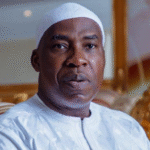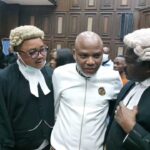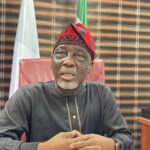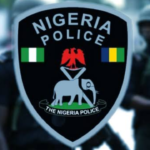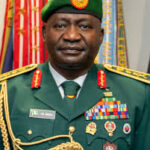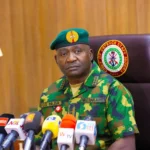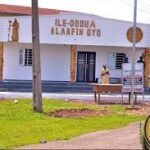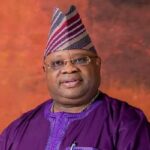Now Reading: 2015 APC win: Tinubu, Atiku merger added 3.2 million votes — Ex-SGF
-
01
2015 APC win: Tinubu, Atiku merger added 3.2 million votes — Ex-SGF
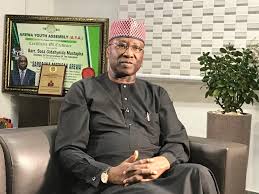
2015 APC win: Tinubu, Atiku merger added 3.2 million votes — Ex-SGF
Former Secretary to the Government of the Federation, Boss Mustapha, has disclosed that the 2013 merger involving the Action Congress of Nigeria, the new Peoples Democratic Party and other stakeholders contributed 3.2 million votes to aid ex-President Muhammadu Buhari’s victory.
Delivering a lecture on Buhari’s role in national development, during the public presentation of “According to the President: Lessons from a Presidential Spokesman’s Experience,” a book authored by former presidential spokesperson, Garba Shehu, in Abuja, on Wednesday, Mustapha said the merger yielded additional 3.2 million votes to Buhari’s 12.2 million votes to secure victory over then-incumbent President Goodluck Jonathan in 2015.
At the book presentation were former Vice Presidents, Yemi Osinbajo and Atiku Abubakar, Chief of Staff to former President Muhammadu Buhari, Prof Ibrahim Gambari, former Governors Kayode Fayemi (Ekiti), Nasir El-Rufai (Kaduna), former ministers, Lai Mohammed (Information), Isa Ali Pantami (Communication and Digital Economy), Sadiya Umar Farouq (Humanitarian Affairs, Disaster Management and Social Development), Solomon Dalung (Youth and Sport),
While Buhari led the defunct Congress for Progressive Change, Bola Tinubu led the defunct Action Congress of Nigeria.
Also, Atiku, alongside others from the Peoples Democratic Party and those from the All Nigeria Peoples Party merged to form the All Progressives Congress.
Other prominent figures in the coalition are former Senate President, Bukola Saraki, former Minister of Transportation, Rotimi Amaechi, former Kano State Governor, Rabiu Kwankwaso, former Imo State Governor, Rochas Okorocha, Vice President Kashim Shettima, among others.
At the APC presidential primary held in Lagos, Buhari defeated Atiku, Okorocha, Kwankwaso and others to emerge as the party’s candidate.
Ahead of the 2023 election, Tinubu, then a presidential aspirant, had recalled how he supported Buhari’s 2015 victory, a comment that sparked mixed reactions among their respective supporters.
Clarifying the events, Mustapha, a former member of the defunct ACN, stressed the importance of recognising Buhari’s role in reshaping Nigeria’s political landscape.
He stated, “In early 2013, as the leader of the Congress for Progressive Change, President Buhari, formally requested and supported the creation of the CPC merger committee, part of a broader coalition-building process that brought together the ACN—the party under which I served as the Deputy National Chairman at that time.
“We also had our own transition merger committee, the ANPP, and a fraction of others. And elements of the ruling party, through the breakaway New PDP group, his endorsement and participation, along with other party leaders such as President Bola Tinubu and Senator Ali Modu Sheriff, who was the chairman of the Board of Trustees of the ANPP lent credence, credibility, and direction to the merger, helping to unify it.
“This led to significant participation under the banner of the All Progressives Congress. That coalition built and paved the way for the first democratic defeat of an incumbent ruling party in Nigeria’s history. President Buhari’s integrity, national stature, and disciplined messaging were central to that breakthrough.
“Not only that, for us in the ACN, I do not intend to stir any controversy, but I will make bold to state this—that the merger in 2013 was midwife to present a Buhari or create a Buhari Presidency.”
Mustapha stated that choosing Buhari as the presidential candidate in 2015 was the most practical and strategic decision for the APC.
He continued, “Because we looked at the statistics of the votes that were coming to the table. In the 2003 election against Obasanjo, Buhari polled 12.7 million votes. In the 2007 election against Yar’Adua, he received 6.6 million votes after the PDP unleashed its machinery.
“In 2011, it went up to 12.2 million votes. And when we were considering the merger, we said: What would give us a head start? Obviously, it was in the back of our consciousness that the merger with the CPC—though the CPC at that time had only one state, the ACN had six states, and the ANPP had three states.
“But when you sum up the total votes that gave us the presidency in 2015, the aggregate was 15.4 million votes.
“So basically, what we brought to the table, the other parties that were in the merger, in addition to Buhari’s 12.2 million votes, was 3.2 million votes.
“I do not intend to create any controversy, but I am saying that was the most realistic and pragmatic thing that we needed to do.”
Mustapha said Buhari’s public service was defined not only by the offices he held but also by his deep bond with many Nigerians.
He noted that upon assuming office in May 2015, Buhari faced major economic and security crises—marked by falling oil prices, declining revenue, and a rising Boko Haram threat—and responded with fiscal discipline, increased capital spending, and institutional reforms to stabilise the nation and restore public trust.
He also said infrastructure was central to the Buhari presidency, adding that the administration prioritised transformative legacy projects such as the Second Niger Bridge, Lagos–Ibadan Expressway, Abuja–Kaduna–Kano highway, and Warri–Itakpe rail line, each improving mobility, logistics, and regional connectivity.
He added that the standard gauge railway from Lagos to Kano was a cornerstone of the effort, envisioned as a federal spine for passenger and freight movement, with completed segments like the Lagos–Ibadan and Abuja–Kaduna lines already in operation.
The former SGF said Buhari would be remembered not only for performance but for principles, for anchoring governance in systems that endure.
“Each administration inherits unfinished work and must carry it forward with clarity and conviction. In this sense, Buhari’s leadership was not about finality, but about setting things in motion; reforms that could outlast him, institutions that could withstand political tides, and a temperament that reminded the state of its quiet obligations to its citizens,” he said.
Speaking at the event, Tinubu said the Buhari administration laid the foundation for key reforms in security, economy, infrastructure, and the public sector.
Tinubu also praised Buhari’s leadership as being rooted in integrity, accountability, prudence, and patriotism.
Represented by the SGF, George Akume, Tinubu assured Nigerians that his government would build upon and deepen the reform-driven legacy initiated by Buhari.
He stated, “Former President Muhammadu Buhari is a man whose leadership stood on the pillars of integrity, accountability, prudence as well as patriotism.
“Under his stewardship, Nigeria witnessed a decisive push to confront insecurity, a serious commitment to infrastructure renewal, a renewed focus on self-reliance and a clear effort to sanitise the public sector.
“These themes resonate strongly in this book and must be appreciated in their full historic dimensions.
“From the restoration of fiscal discipline to the diversification of the economy, from the development of critical national infrastructure to the transformation of our rail and road networks, and from the expansion of social investment programmes to the repositioning of the agricultural sector, President Buhari’s era reflected an earnest attempt to reposition Nigeria for future resilience.”
Tinubu added that Buhari was deliberate and consistent in foreign policy, adding that Nigeria’s voice remained steady and respected within the African Union and the international community.
“Our engagements with global partners were guided by a principled foreign policy doctrine that upheld national interest, regional stability and non-alignment,” he added.
The President also commended Buhari’s humility and restraint in the exercise of presidential power.
“In the face of provocation, he remained calm. In moments of uncertainty, he held steady. His was a Presidency of discipline and quiet strength,” Tinubu added.
The President said Shehu’s book offered a valuable behind-the-scenes insight, describing it as a rich source of knowledge for public communicators, policymakers, scholars, historians, and the general Nigerian public.
He continued, “It offers key lessons on leadership communication, governance under pressure and the intersection between power and public perception.
“As a nation, we must never get tired of documenting our journey. If we must move forward purposefully, we must learn from the past with honesty.
“Books like this play a vital role in that learning process. They preserve memory, illuminate truth and sharpen our collective understanding of nationhood.
“The efforts of one administration lay the foundation for the next. In this regard, I acknowledge the efforts of my predecessor, President Buhari, and assure all Nigerians that the reform-oriented path he initiated will be consolidated and strengthened under this administration.”
The Chairman of the occasion and former Head of State, Gen Yakubu Gowon, stressed the vital role communication played in governance and the process of nation-building.
He noted that a President’s actions, policies and programmes, no matter how noble or well-conceived, must be clearly communicated to the public.
Gowon said, “During his eight-year Presidency, Buhari tried his best to contend with the overwhelming problems, one of such is the security situation in Nigeria.
“The officers and men of the Nigerian Armed Forces and the other security agencies must be commended for their efforts and sacrifices.
“As Nigerians, we must wholeheartedly support the Armed Forces as they risk their lives to keep us alive. We must not allow insurgency or insecurity to threaten the corporate existence of our nation.
“I know General Buhari to be a staunch believer of the Nigeria project. I know him as a person not inclined to worldly or materialistic overtures.
“No matter the misconceptions about Gen Buhari, you can’t take away the fact that he has the firm interest of Nigeria at heart. I also know that he will do everything to keep his integrity intact.”
Gowon described Buhari as a man of austere lifestyle.
“I was therefore not surprised when the author (on page 114) of the book narrated an incident that rightly depicted the General Buhari that I know.
“According to Garba Shehu, shortly after being sworn in as President and Commander-in-Chief, General Buhari was informed of the need to increase the budget for catering services in the Villa.
“He then asked what the existing budget was. When they told him it was N10m for the State House, including the Vice President, guest houses and banquets in honour of visiting leaders, he screamed and asked that even the N10m be drastically reduced.”
Source:- Punch






